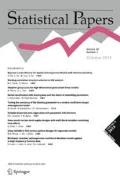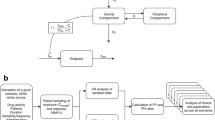Abstract
Objectives in Phase II drug combination studies are to estimate the efficacy response surface for the combination of doses of different drugs and to select the most efficient combination for the final Phase III clinical trial. One problem is to find an optimal design that allocates subjects to the dose-combinations which will maximize the information obtained in the trial. Adaptive designs help in these situations to ensure high efficiency of the study design. We are using a binary efficacy endpoint and consider the practical situation when the timing of the endpoint assessment period on the subject level is considerably longer relative to the inter-arrival time of subjects. This poses implementation challenges for the adaptive design. A solution to the adaptive design problem by using time-to-event models as longitudinal model will be presented.



Similar content being viewed by others
Change history
12 September 2019
Unfortunately, due to a technical error, the articles published in issues 60:2 and 60:3 received incorrect pagination. Please find here the corrected Tables of Contents. We apologize to the authors of the articles and the readers.
References
Atkinson AC, Donev AN, Tobias RD (2007) Optimum Experimental Designs, with SAS. Oxoford University Press, Oxford
Atkinson AC, Fedorov VV, Herzberg AM, Zhang R (2014) Elemental information matrices and optimal experimental design for generalized regression models. J Stat Plan Inference 144:81–91
Cai C, Liu S, Yuan Y (2014) A Bayesian design for phase II clinical trials with delayed responses based on multiple imputation. Stat Med 33:4017–4028
Fedorov VV, Leonov SL (2013) Optimal Design for Nonlinear Response Models. Chapman & Hall/CRC Biostatistics Series, Boca Raton
Finney D (1971) Probit Analysis. Cambridge University Press, Cambridge
Kiefer J, Wolfowitz J (1960) The equivalence of two extremum problems. Can J Math 12:363–366
Lehmann EL, Casella G (1998) Theory of Point Estimation, 2nd edn. Springer, New York
Liu S, Ning J (2013) A Bayesian dose-finding design for drug combination trials with delayed toxicities. Bayesian Anal 8:703–722
Pronzato L, Pazman A (2013) Design of Experiments in Nonlinear Models. Springer, New York
Wu CFJ (1988) Optimal design for percentile estimation of a quantal response curve. In: Dodge Y, Fedorov VV, Wynn HP (eds) Optimal Design and Analysis of Experiments. Elsevier, North Holland, pp 213–223
Author information
Authors and Affiliations
Corresponding author
Additional information
Publisher's Note
Springer Nature remains neutral with regard to jurisdictional claims in published maps and institutional affiliations.
Rights and permissions
About this article
Cite this article
Mielke, T., Dragalin, V. Adaptive designs for drug combination informed by longitudinal model for the response. Stat Papers 60, 355–371 (2019). https://doi.org/10.1007/s00362-018-01073-9
Received:
Revised:
Published:
Issue Date:
DOI: https://doi.org/10.1007/s00362-018-01073-9




